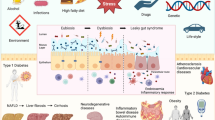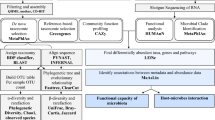Abstract
The intestinal microbiota is complex and features several bacterial species pertaining to a wide variety of strains. Anatomically, the microbiota is in close contact with the intestinal mucosa and epithelial interface. Therefore, the microbiota has been hypothesized to play important roles in human health, ranging from modulation of the immune response to direct influence on intestinal function. From a nutraceutical viewpoint, the notion of modifying the microbiota with appropriate formulations, namely probiotics, is being tested in several clinical and real-life settings.
While the public understanding of probiotics and of their healthful roles is quite established, the vast majority of health claims have not been approved by the EFSA. This article critically analyzes the current hurdles in probiotic research and discusses both limitations and evidence in support of the use of probiotics in prevention and therapy.
Similar content being viewed by others
References
Aureli P, Capurso L, Castellazzi AM, Clerici M, Giovannini M, Morelli L et al (2011) Probiotics and health: an evidence-based review Pharmacol Res 63 366–376
Quigley EM (2010) Prebiotics and probiotics; modifying and mining the microbiota Pharmacol Res 61 213–218
Laparra JM, Sanz Y (2010) Interactions of gut microbiota with functional food components and nutraceuticals Pharmacol Res 61 219–225
Jones BV, Marchesi JR (2007) Accessing the mobile metagenome of the human gut microbiota Mol Biosyst 3 749–758
Ley RE, Hamady M, Lozupone C, Turnbaugh PJ et al (2008) Evolution of mammals and their gut microbes Science 320 1647–1651
Qin J, Li R, Raes J, Arumugam M, Burgdorf KS et al (2010) A human gut microbial gene catalogue established by metagenomic sequencing Nature 464 59–65
Jones BV, Sun F, Marchesi JR (2010) Comparative metagenomic analysis of plasmid encoded functions in the human gut microbiome BMC Genomics 11 46
Kurokawa K, Itoh T, Kuwahara T, Oshima K et al (2007) Comparative metagenomics revealed commonly enriched gene sets in human gut microbiomes DNA Res 14 169–181
Gill SR, Pop M, Deboy RT, Eckburg PB (2006) Metagenomic analysis of the human distal gut microbiome Science 312 1355–1359
Hooper LV, Gordon JI (2001) Commensal host-bacterial relationships in the gut Science 292 1115–1118
Backhed F, Ley RE, Sonnenburg JL, Peterson DA, Gordon JI (2005) Host-bacterial mutualism in the human intestine Science 307 1915–1920
Ley RE, Peterson DA, Gordon JI (2006) Ecological and evolutionary forces shaping microbial diversity in the human intestine Cell 124 837–848
Cani PD, Delzenne NM (2009) The role of the gut microbiota in energy metabolism and metabolic disease Curr Pharm Des 15 1546–1558
Resta SC (2009) Effects of probiotics and commensals on intestinal epithelial physiology: implications for nutrient handling J Physiol 587 4169–4174
Lanning DK, Rhee KJ, Knight KL (2005) Intestinal bacteria and development of the B-lymphocyte repertoire Trends Immunol 26 419–425
Ley RE 2010 Obesity and the human microbiome Curr Opin Gastroenterol 26 5–11
Falk PG, Hooper LV, Midtvedt T, Gordon JI (1998) Creating and maintaining the gastrointestinal ecosystem: what we know and need to know from gnotobiology Microbiol Mol Biol Rev 62 1157–1170
Caballero-Franco C, Keller K, De Simone C, Chadee K (2007) The VSL#3 probiotic formula induces mucin gene expression and secretion in colonic epithelial cells Am J Physiol Gastrointest Liver Physiol 292 G315–G322
FAO (2001) Health and nutritional properties of probiotics in food including powder milk with live lactic acid bacteria http://wwwfaoorg
FAO (2002) Guidelines for the evaluation of probiotics in food http://wwwfaoorg
Thomas CM, Versalovic J (2010) Probiotics-host communication: Modulation of signaling pathways in the intestine Gut Microbes 1 1–16
AFFSA (2005) Effets des probiotiques et prébiotiques sur la flore et l’immunité de l’homme adulte
EFSA (2004) Scientific Colloquium Summary Report. QPS: qualified presumption of safety of microorganisms in food and feed
Barlow S, Chesson A, Collins JD, Dybing E, Flynn A et al (2007) Introduction of a qualified presumption of safety QPS approach for assessment of selected microorganisms referred to EFSAOpinion of the Scientific Committee EFSA J 587 1–16
Chmielewska A, Szajewska H (2010) Systematic review of randomised controlled trials: probiotics for functional constipation World J Gastroenterol 16 69–75
Lee MC, Lin LH, Hung KL, Wu HY (2001) Oral bacterial therapy promotes recovery from acute diarrhea in children Acta Paediatr Taiwan 42 301–305
Yan F, Polk DB (2002) Probiotic bacterium prevents cytokine-induced apoptosis in intestinal epithelial cells J Biol Chem 277 50959–50965
Tien MT, Girardin SE, Regnault B, Le Bourhis L, Dillies MA, Coppee JY et al (2006) Anti-inflammatory effect of Lactobacillus casei on Shigella-infected human intestinal epithelial cells J Immunol 176 1228–1237
Takeda K, Suzuki T, Shimada SI, Shida K, Nanno M, Okumura K (2006) Interleukin-12 is involved in the enhancement of human natural killer cell activity by Lactobacillus casei Shirota Clin Exp Immunol 146 109–115
Takeda K, Okumura K (2007) Effects of a fermented milk drink containing Lactobacillus casei strain Shirota on the human NK-cell activity J Nutr 137 791S–793S
Niers LE, Hoekstra MO, Timmerman HM, van Uden NO, de Graaf PM, Smits HH et al (2007) Selection of probiotic bacteria for prevention of allergic diseases: immunomodulation of neonatal dendritic cells Clin Exp Immunol 149 344–352
Kaur IP, Chopra K, Saini A (2002) Probiotics: potential pharmaceutical applications Eur J Pharm Sci 15 1–9
Marco ML, Pavan S, Kleerebezem M (2006) Towards understanding molecular modes of probiotic action Curr Opin Biotechnol 17 204–210
Perdigon G, Alvarez S, Medina M, Vintini E, Roux E (1999) Influence of the oral administration of lactic acid bacteria on iga producing cells associated to bronchus. Int J Immunopathol Pharmacol 12 97–102
Morimoto K, Takeshita T, Nanno M, Tokudome S, Nakayama K (2005) Modulation of natural killer cell activity by supplementation of fermented milk containing Lactobacillus casei in habitual smokers Prev Med 40 589–594
Hatakka K, Savilahti E, Ponka A, Meurman JH et al (2001) Effect of long term consumption of probiotic milk on infections in children attending day care centres: double blind, randomised trial BMJ 322 1327
Lin JS, Chiu YH, Lin NT, Chu CH, Huang KC et al (2009) Different effects of probiotic species/strains on infections in preschool children: A double-blind, randomized, controlled study Vaccine 27 1073–1079
Marseglia GL, Tosca M, Cirillo I, Licari A, Leone M et al (2007) Efficacy of Bacillus clausii spores in the prevention of recurrent respiratory infections in children: a pilot study Ther Clin Risk Manag 3 13–17
Zuccotti GV, Meneghin F, Raimondi C, Dilillo D, Agostoni C, Riva E et al (2008) Probiotics in clinical practice: an overview J Int Med Res 36 Suppl 1 1A–53A
Davidson GP, Butler RN (2000) Probiotics in pediatric gastrointestinal disorders Curr Opin Pediatr 12 477–481
Szajewska H, Setty M, Mrukowicz J, Guandalini S (2006) Probiotics in gastrointestinal diseases in children: hard and not-so-hard evidence of efficacy J Pediatr Gastroenterol Nutr 42 454–475
Michail S, Sylvester F, Fuchs G, Issenman R (2006) Clinical efficacy of probiotics: review of the evidence with focus on children J Pediatr Gastroenterol Nutr 43 550–557
Guandalini S (2006) Probiotics for children: use in diarrhea. J Clin Gastroenterol 40 244–248
Van Niel CW, Feudtner C, Garrison MM, Christakis DA (2002) Lactobacillus therapy for acute infectious diarrhea in children: a meta-analysis Pediatrics 109 678–684
Szymanski H, Pejcz J, Jawien M, Chmielarczyk A, Strus M, Heczko PB (2006) Treatment of acute infectious diarrhoea in infants and children with a mixture of three Lactobacillus rhamnosus strains—a randomized, double-blind, placebo-controlled trial Aliment Pharmacol Ther 23 247–253
Szajewska H, Ruszczynski M, Radzikowski A (2006) Probiotics in the prevention of antibiotic-associated diarrhea in children: a meta-analysis of randomized controlled trials. J Pediatr 149 367–372
Cremonini F, Di Caro S, Nista EC, Bartolozzi F, Capelli G, Gasbarrini G et al (2002) Meta-analysis: the effect of probiotic administration on antibiotic-associated diarrhoea. Aliment Pharmacol Ther 16 1461–1467
D’Souza AL, Rajkumar C, Cooke J, Bulpitt CJ (2002) Probiotics in prevention of antibiotic associated diarrhoea: meta-analysis BMJ 324 1361
Arvola T, Laiho K, Torkkeli S, Mykkanen H, Salminen S, Maunula L et al (1999) Prophylactic Lactobacillus GG reduces antibiotic-associated diarrhea in children with respiratory infections: a randomized study Pediatrics 104 e64
Lewis SJ, Potts LF, Barry RE (1998) The lack of therapeutic effect of Saccharomyces boulardii in the prevention of antibiotic-related diarrhoea in elderly patients J Infect 36 171–174
McFarland LV (2009) Evidence-based review of probiotics for antibiotic-associated diarrhea and Clostridium difficile infections Anaerobe 15 274–280
Claud EC, Walker WA (2001) Hypothesis: inappropriate colonization of the premature intestine can cause neonatal necrotizing enterocolitis FASEB J 15 1398–1403
Abrahamsson TR, Jakobsson T, Bottcher MF, Fredrikson M, Jenmalm MC, Bjorksten B et al (2007) Probiotics in prevention of IgE-associated eczema: a double-blind, randomized, placebo-controlled trial J Allergy Clin Immunol 119 1174–1180
Taylor AL, Dunstan JA, Prescott SL (2007) Probiotic supplementation for the first 6 months of life fails to reduce the risk of atopic dermatitis and increases the risk of allergen sensitization in high-risk children: a randomized controlled trial J Allergy Clin Immunol 119 184–191
Kukkonen K, Savilahti E, Haahtela T, Juntunen-Backman K, Korpela R, Poussa T et al (2007) Probiotics and prebiotic galacto-oligosaccharides in the prevention of allergic diseases: a randomized, double-blind, placebo-controlled trial J Allergy Clin Immunol 119 192–198
Valsecchi C, Marseglia A, Ricci A, Montagna L, Leone M, Marseglia GL et al (2008) Probiotics and children: is an integration useful in allergic diseases? Pediatr Med Chir 30 197–203
Johannsen H, Prescott SL (2009) Practical prebiotics, probiotics and synbiotics for allergists: how useful are they? Clin Exp Allergy 39 1801–1814
Yao TC, Chang CJ, Hsu YH, Huang JL (2010) Probiotics for allergic diseases: realities and myths Pediatr Allergy Immunol 21 900–919
Rautava S, Salminen S, Isolauri E (2009) Specific probiotics in reducing the risk of acute infections in infancy—a randomised, double-blind, placebo-controlled study Br J Nutr 101 1722–1726
Leyer GJ, Li S, Mubasher ME, Reifer C, Ouwehand AC (2009) Probiotic effects on cold and influenza-like symptom incidence and duration in children Pediatrics 124 e172–e179
de Vrese M, Winkler P, Rautenberg P, Harder T et al (2005) Effect of Lactobacillus gasseri PA 16/8, Bifidobacterium longum SP 07/3, B. bifidum MF 20/5 on common cold episodes: a double blind, randomized, controlled trial Clin Nutr 24 481–491
Pregliasco F, Anselmi G, Fonte L, Giussani F, Schieppati S, Soletti L (2008) A new chance of preventing winter diseases by the administration of synbiotic formulations J Clin Gastroenterol 42 Suppl 3 Pt 2 S224–S233
Boge T, Remigy M, Vaudaine S, Tanguy J, Bourdet-Sicard R, van der WS (2009) A probiotic fermented dairy drink improves antibody response to influenza vaccination in the elderly in two randomised controlled trials Vaccine 27 5677–5684
Guillemard E, Tondu F, Lacoin F, Schrezenmeir J (2010) Consumption of a fermented dairy product containing the probiotic Lactobacillus casei DN-114001 reduces the duration of respiratory infections in the elderly in a randomised controlled trial Br J Nutr 103 58–68
Vouloumanou EK, Makris GC, Karageorgopoulos DE et al (2009) Probiotics for the prevention of respiratory tract infections: a systematic review Int J Antimicrob Agents 197 1–10
Author information
Authors and Affiliations
Rights and permissions
About this article
Cite this article
Visioli, F., Poli, A. Current issues on probiotics in human health. Nutrafoods 10, 9–15 (2011). https://doi.org/10.1007/BF03223354
Issue Date:
DOI: https://doi.org/10.1007/BF03223354




